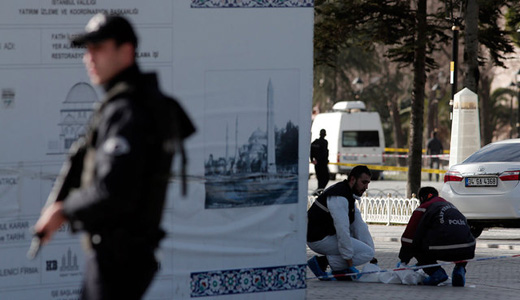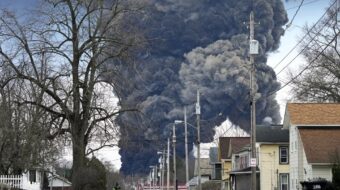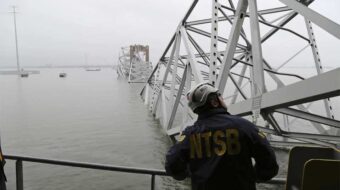
On Tuesday, a suicide bombing, evidently carried out by the Islamic State in Iraq and Syria, or Daesh as it is called in Arabic, killed ten German tourists in a historic square in downtown Istanbul, Turkey. This bombing, and another carried out shortly thereafter in Diyarbakir, in the heavily Kurdish Southeast of the country, have raised tensions in this country of 78 million to the boiling point, and have led to threats of more repression of the government’s many critics.
The bombing in the Sultanahmet district, within sight of the beautiful Blue Mosque and a major tourist area, was carried out by a Syrian ISIS member. In addition to the dead, there were many people injured. Speculation locally is that ISIS wishes to disrupt Turkey’s lucrative tourism industry. Last year, there were several deadly bombings, also attributed to ISIS, that were aimed at Turkey’s large and disaffected Kurdish population. There the motive appears to be related to the fact that Kurdish militia in Northern Syria have become recognized as one of the most effective forces fighting against ISIS in that country’s civil war. A bombing on July 20 in Suruç killed 33 young Kurds who were meeting to organize support for the besieged people of Kobani, across the border in Syria. Then on October 10, another bombing targeted a pro-Kurdish rally in Ankara, Turkey’s capital, killing at least 102 people, including several political leaders of the opposition organizations that had organized the rally.
After those bombings, Kurdish and left-wing organizations in Turkey fiercely denounced the conservative Islamist government of President RegepTayyipErdogan, of the Justice and Development Party (AKP), accusing it of possible complicity in the bombing attacks, or at least of negligence in preventing them. This time, the accusations were repeated with greater intensity.
Before the latest bomb attacks, a group of more than a thousand academics and intellectuals from 89 different universities, most of them Turkish but including distinguished international scholars such as Noam Chomsky, David Harvey, Emmanuel Wallerstein and SlavojZizek, sent a strongly worded open letter to Erdogan demanding that he prioritize the fight against ISIS/Daesh and return to negotiations with the Kurdish Workers’ Party (known by its Kurdish initials, PKK).
In fact, Erdogan had earlier received credit for involving the PKK in peace negotiations to end the decades-long standoff between the Kurdish leftist group and successive Turkish governments. However, on June 7, 2015, Erdogan’s party, the AKP, lost its parliamentary majority when it was taken by surprise by the electoral advance of another left-wing, mostly Kurdish party, the People’s Democratic Party, or HDP.
This prevented Erdogan from moving forward on his plan to change Turkey into a presidentially dominated republic instead of a parliamentary democracy. After that, Erdogan, accusing the HDP of being a stalking horse for the PKK, essentially scuttled his peace approach and soon had the relationship between the government and the Kurds on a war footing once more. As the level of violence between the military and the PKK rose again, Erdogan and his Prime Minister, DavudAhmetoglu, called a snap election on November 1, 2015, in an atmosphere in which the opposition HDP and its press were under harassment and repression by the government. Unsurprisingly, the AKP majority was restored, though the HDP was not driven from parliament.
Erdogan’s critics voiced suspicions that the government, which has played a major role in efforts to overthrow Syria’s President Bashir Al Assad, had made a de facto alliance with violent Islamist factions in Syria, and was making a minimum effort against ISIS while concentrating the military’s major resources against the Kurds. The suspicion also arose that ISIS was funding itself by shipping oil out of Syria into Turkey, finding ready purchasers there while the government turned a blind eye.
The United States, meanwhile, has developed a de facto military alliance with Kurdish fighters in Northern Syria whom the Obama administration sees as the most effective anti-ISIS force. As the Syrian Kurdish militia is seen as closely allied to the PKK, this complicates U.S. relations with Turkey, its ally in NATO. Erdogan has wanted to declare a no-fly zone over northern Syria, something Obama opposes. Responding to these pressures, the Turkish government has made recent moves to hit ISIS targets in Syria and Iraq.
Erdogan has gotten his country into a complicated situation. But the bold and aggressive response to criticism remains his hallmark. In response to the academics who signed the open letter, Erdogan has called them complicit with terrorism and is evidently going after them with repressive moves. He has asked academic authorities in Turkey to require that universities fire all signatories of the letter, who may also be prosecuted for their words.
He is unable to fire the international signatories, but he can insult them. He accused Noam Chomsky, the distinguished linguist and trenchant critic of imperialism, of having a “colonialist” mentality. Erdogan challenged him to come to Turkey and present his views and have them refuted. Chomsky declined the invitation.
Meanwhile, on Wednesday, a notorious Turkish gangster, SedatPeker, called for signatories of the academic letter to be killed. He was quoted in the English-language edition of the opposition daily paper Hurriyet saying, “We will let your blood [flow] in streams and we will take a shower in your blood.” Peker was active in supporting Erdogan’s AKP in the November elections and is considered a government ally. Needless to say, his comments elicited further pointed protests from the opposition.
Photo: AP












Comments